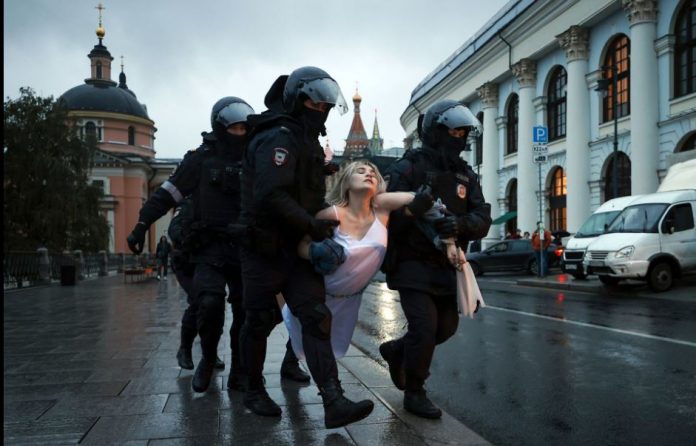Italy, having elected a far-right leader, should know: authoritarians enjoy the support of the democratically indifferent – until the knock is on their door.
What do new Italian Prime Minister Georgia Meloni, Benjamin Netanyahu, Marine Le Pen, and Donald Trump have in common? All are popular leaders in democratic countries whose supporters are unafraid to support autocrats-in-training.
These blasé backers of illiberalism might want to talk to a few Russians.
They might learn how hundreds of thousands are currently scrambling to flee Russia to escape economic devastation and conscription into a failing war of choice. Tickets to countries that might receive them—from Kazakhstan to Armenia—have run out or cost a black-market-level fortune.
These would-be escapees doubtless include many who have voted for longtime Russian President Vladimir Putin. They did so knowing who Putin was—a KGB operative masquerading as a political leader.
Such choices, in Russia as elsewhere, are driven by the myriad ills of modern political discourse and behavior: indifference, inattention, complacency, an infantile desire for strong leadership, a weakness for nationalist tropes, and jealousy of snooty „elites” (who mostly can see what’s coming but are outnumbered, always).
The overarching essence is the the human tendency—unbecoming in both its indecency and naivete—to assume that while others may be vulnerable, the proverbial „they” will never come for you. But the open secret is that illiberal regimes that care nothing for the protection of the minority will eventually turn on the majority as well. And then it will be too late.
The elections Putin won in 2000, 2004, 2008 and 2012 were imperfect, because state media always supported him and candidates’ access to voters was not equal. But they were not overtly falsified, and important international watchdogs judged them to be essentially free.
Yet signs of the real Putin were always there to be seen: fake charges and even faker trials for Putin rivals like the disobedient oligarch Mikhail Khodorkovsky (2003); astounding brutality in dealing with security challenges like the school hostage crisis in Beslan (2004); Ukrainian rival Viktor Yushchenko finding himself mysteriously disfigured (2004); the fatal poisoning of turncoat spy Alexander Litvinenko in London (2006); the dispatching of pesky journalists like Anna Politkovskaya, found dead in a Moscow elevator (2006).
Gradually, he stamped out of the free press and the NGO ecosystem; defanged the parliamentary system; intimidated the opposition; coopted the business elite; domesticated the judiciary; and transformed the police and security apparatus into agents of the Kremlin.
The people of Russia were as the metaphorical frog in water brought slowly to a boil. No one can say exactly when democracy died—but no one can deny that now it is dead. Russia is a totalitarian state where criticizing Putin’s disastrous decision to invade Ukraine will land a person in jail, or worse, as can be seen by a series of defenestrations.
It is impossible to gauge the current true domestic popularity of Putin and his actions. Criticism cannot be expressed, and information is not available to most, especially in the provinces, where people are anyway more conservative. The country, a nuclear power, festers under a cloud of obfuscation and nonsense.
Is Italy now in danger of following Russia’s path? The Brothers of Italy, with roots in Benito Mussolini’s Fascist party, won a plurality in the election last Sunday and were swiftly installed in power. The new prime minister is the country’s first female leader and the first to come from the far-right.
Her success results from the failure of others, mainly in fixing an economy trapped in decades-long recession. The endless downturn has left more than a third of people under 25 unemployed, and the nation with the second-highest ratio of sovereign debt to GDP in the European Union.
But it wasn’t just the economy that flattened mainstream politicians: crime, corruption, a politicized judiciary, and COVID-19 all played a part.
The result was a vote where many people, judging incorrectly that things cannot be worse, either supported Meloni or did not vote.
Still, despite the fact Meloni rails against gay rights, secularism, Islam, and immigration, and was in the past an apologist for Putin, Italy’s shambolic democracy may yet survive. After all, the country cannot afford to upset the EU, on which it depends for funding, and Italian governments are notoriously unstable.
Something similar can be hoped for in Sweden, with its own surging far-right party called the Sweden Democrats.
But in France, 40 percent of the voters supported Marine Le Pen in this year’s presidential election. If she eventually tips the scales—which seems one economic crisis away—the Fifth Republic may be the nation’s last.
The danger is both greater and more imminent in Israel, where Netanyahu is now running as head of the opposition while facing trial on bribery and other charges, plainly intending to machinate cancellation of the trial.
Netanyahu’s allies have made clear that the plan is to introduce legislation that allows the overturning of Supreme Court decisions with a simple parliamentary majority. That amounts to cancellation of judicial oversight of the executive. They also intend to politicize the courts and the state prosecution, and more.
That would take Israel many steps in the direction of fake democracies that have already been established, roughly in the same ways, in Turkey, Poland, and Hungary.
Is America immune?
The United States has a strong constitution, but one whose extreme distribution of power creates many holes for an authoritarian to exploit. Former President Donald Trump tested it to the limit in his first term in office.
Should the Republicans, in their new incarnation as an authoritarian party, return to power, in the midterms and then in 2024, the world may be in for a big surprise.
Copycat mini-Putins all over the world are rooting for just this. The main weapon in their arsenal is the indifference of the masses—until their rude awakening at the knock upon the door.
This article appeared originally in Newsweek.
Dan Perry is managing partner of the New York-based communications firm Thunder11. He is the former Cairo-based Middle East editor and London-based Europe/Africa editor of the Associated Press. Follow him at twitter.com/perry_dan
Nine countries condemn Russia for crimes, atrocities, misappropriating Holocaust history

















